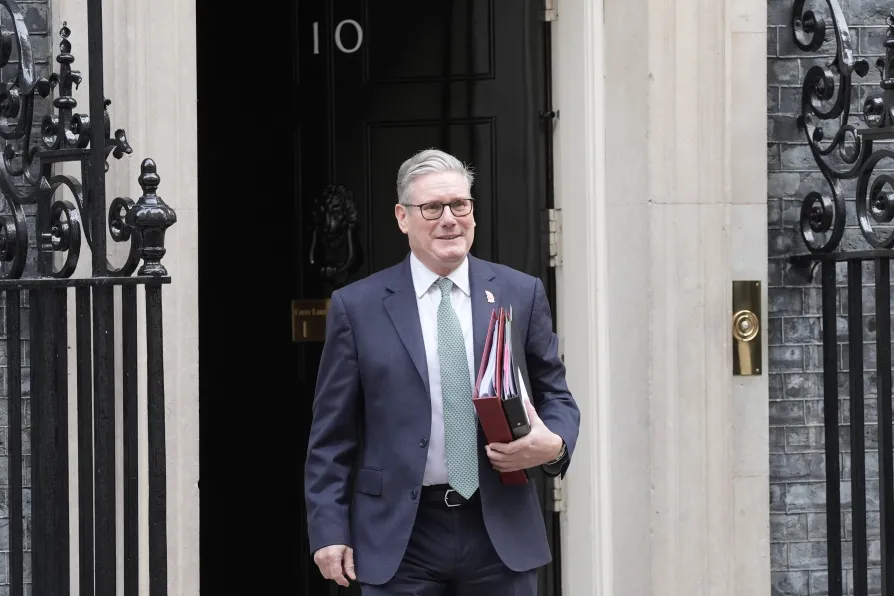
 Prime Minister Keir Starmer departs 10 Downing Street, London, to attend Prime Minister's Questions at the Houses of Parliament, November 12, 2025
Prime Minister Keir Starmer departs 10 Downing Street, London, to attend Prime Minister's Questions at the Houses of Parliament, November 12, 2025
IF KEIR STARMER intended to stave off a leadership challenge by advertising his readiness to fight one, he has miscalculated.
All his intervention has done is placed the question of his leadership at the top of MPs’ minds.
Perhaps identifying Wes Streeting as a possible challenger was intended to frighten the left away from triggering a contest — since Streeting is even further right than Starmer.
In practice it simply showcases the Prime Minister’s insecurity and the toxic culture Streeting accurately describes in Downing Street — where the government briefs against its own, and a leadership that has always relied on bans and expulsions to maintain authority descends into a “circular firing squad,” to use the ever eloquent Barry Gardiner’s phrase. Unlike Starmer, MPs might reflect, Streeting has never pretended to be on the left and as a Blairite true believer might at least try to govern through persuasion rather than fear.
Nobody should fear challenging Starmer: his government is as inept as it is cruel and is paving the way for a far-right Reform UK regime.
But Streeting is no solution. The Health Secretary would be a cosmetic change, no more: he’s wedded to the same policies of privatisation and cuts that have wrecked our public services and national infrastructure. Starmer loyalists point to the long death agony of the last Tory government as evidence that switching leader doesn’t help — and it won’t, without dramatic changes in Labour policy.
And that’s a problem. Starmer’s leadership exists to prevent change, not deliver it: its whole mission has been the destruction of Corbynism and the threat of a socialist-led Labour Party. That project was endorsed by the overwhelming majority of Labour MPs even before last year’s election brought in cohorts of carefully vetted conformists.
It cannot win popular support, because it exists to protect a status quo which has long lost legitimacy: but its grip on the Labour Party will not be broken from within. Only external pressure could hope to achieve that.
That pressure is rebuilding, as the social forces that powered Corbynism regroup behind Zack Polanski’s Greens or Jeremy Corbyn and Zarah Sultana’s “Your Party,” which holds its founding conference this month.
This is positive and reflects the reality that Corbynism was defeated within Labour administratively, not politically: Starmer only became leader by affecting loyalty to Corbyn’s programme and widespread support for that programme was silenced but never ceased to exist.
Reassembling the Corbyn coalition will not be enough to defeat Reform, however. The left may have been defeated inside Labour by bans and stitch-ups but it was also defeated at two general elections.
Evidence unveiled subsequently that internal sabotage played a part in its 2017 defeat can lead to a complacent assumption that the Corbyn platform, delivered anew in a party less embroiled with the British Establishment, will sail to victory.
Starmer cannot move beyond the politics of defeating Corbynism, which is why his government is clueless on intractable economic and social problems. But the left cannot afford re-enactment politics either: we lost last time and must understand why.
Corbynism faltered when it wasn’t radical enough: failing to recognise the ruthlessness of the state or the class character of institutions from the media to the European Union. A revived left should be for rupture with the system, not accommodation to it.
And when it did well it was focused on class questions of inequality of wealth and power, when it could appeal to “the many not the few.” When politics shifted to questions of identity — the terrain on which the EU referendum was largely fought — it isolated itself from the working class and was defeated.
Starmer’s days may be numbered, but that matters nothing if the left is unable to challenge for power. To do that it must unite the majority on the basis of what they have in common — their class.










